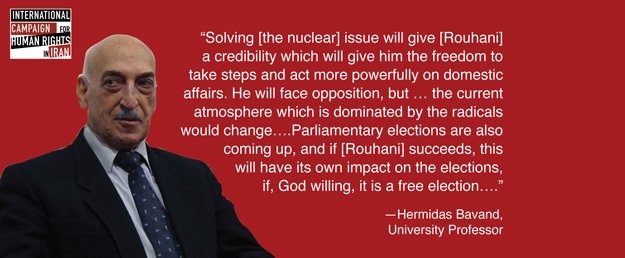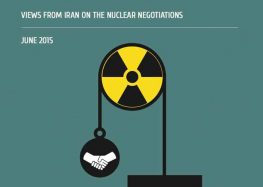The destructive impact of failed negotiations

The interviewees were unanimous that sanctions and Iran’s international isolation had been profoundly destructive to Iranian society, causing severe economic hardship. Indeed, directly contradicting the frequent claims by many Iranian officials to the contrary, many respondents spoke bitterly of the economic costs experienced by ordinary Iranians under the sanctions regime.
Download the report here.
The pain of these sanctions has affected the Iranian nation, and naturally, if an agreement is not reached, this pain would increase….Nuclear, medical, judicial, and economic issues may not be directly related to each other, but there is an indirect relationship among all of them.
–Farideh Gheirat, Lawyer
For a number of years, Iran’s international isolation and all the excuses used for putting pressure on our country, particularly the sanctions, have destroyed the Iranian people’s psychological security, and have left them preoccupied, and of course, many people have suffered direct or indirect loss.
–Fakhrossadat Mohtashamipour, Civil Activist, Wife of Political Prisoner
There was a unanimous and strongly held view by the respondents that a failure to reach a negotiated settlement to the conflict over Iran’s nuclear program, and thus a continuation of sanctions and isolation, would be catastrophic, across the board, for Iran.
[Failed negotiations] would cause terrible damage to the people and to social, cultural, political, and economic activities. The highest cost imposed by the sanctions is paid by the people, particularly the low-income and vulnerable groups.
–Fakhrossadat Mohtashamipour, Civil Activist, Wife of Political Prisoner
[An agreement] would have a fundamental psychological effect on the people, because people feel vested in this agreement. If the negotiations fail, it would be a very heavy outcome for the people.
–Pegah Ahangarani, Actress
If the negotiations fail, there will be very, very worrisome consequences for Iran, not only in the area of the economy, but in political and possibly military arenas.
–Hermidas Bavand, Political Scientist and Spokesperson of National Front
Further deterioration of an already deeply dysfunctional economy (with particularly dire consequences for the lower classes and vulnerable groups in society), the complete discrediting and weakening of the Rouhani administration and moderate forces in Iran more broadly, concomitant strengthening of hardliners, increased repression and further restrictions in political rights and social and cultural freedoms, a marked increase in anti-Western sentiment in Iran and further deterioration in relations with the West, and, most disquieting for those interviewed, possible war, were repeatedly cited by the respondents as direct outcomes of a failure in the negotiations.
The existing situation would worsen. The value of the rial would fall further, and people’s financial and economic problems would worsen. Considering the situation in the region, a war may somehow be imposed on Iran.
— Ghasem Sholeh Sadi Lawyer, Former Member of Parliament, Former Political Prisoner
If this agreement is not reached, the situation will turn even worse than it is now. The sanctions would grow…and would constrict the economy further, then the unemployment rate would grow, and prices…would go through another sharp increase.
— Fariborz Raisdana, Economist, Former Political Prisoner
Social hopelessness would increase drastically. People would once again lose their motivation for reforms…. The failure of the negotiations would equal the failure of moderates and the strengthening of the radical camp….The atmosphere for cultural activities and journalism would become tremendously more difficult….[A] continuation of sanctions would place the country in a defensive mode…[and] the domestic security organs would increasingly pressure the media and journalists in order to silence any voices of dissent.
–A Journalist in Tehran and Former Political Prisoner
The radical forces will become more belligerent against the Rouhani administration, and would attempt to destroy the administration during its remaining time, saying the cabinet’s full energy was invested in the nuclear issue and nothing else was done in other areas.
–Ahmad Shirzad, Physics Professor and Former Member of Parliament
[Failure to reach a deal will result in] an intensification of anti-West political tendencies in Iran [which] will help the overall anti-Western currents in the region, even if indirectly.
–A Civil Rights Lawyer in Tehran
If, God forbid, this should happen, a war may get started.
–Massoud Shafiee, Lawyer

